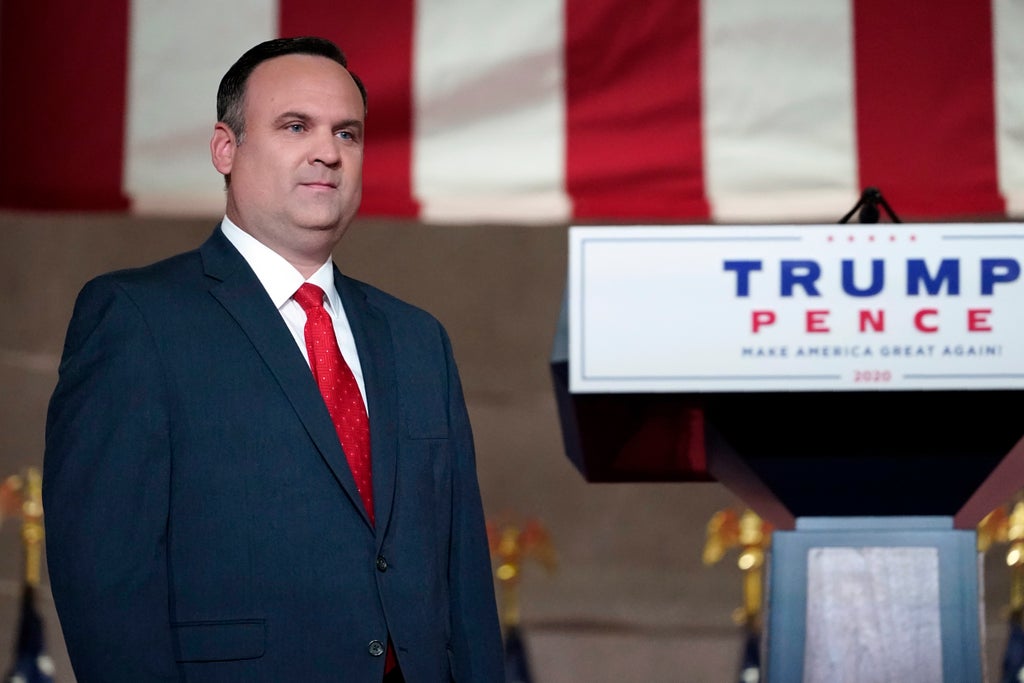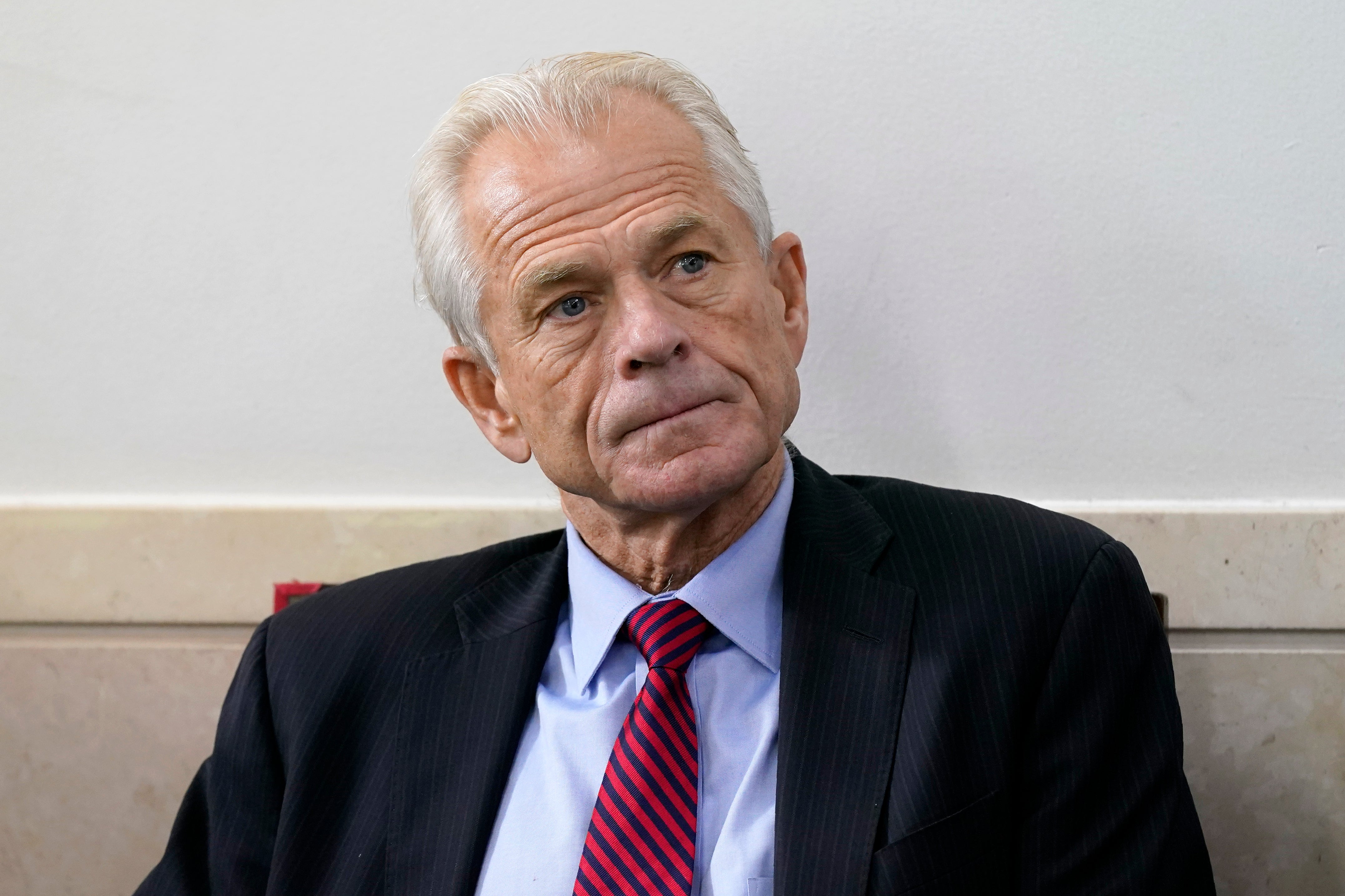
The House of Representatives voted 220-203 to refer two more ex-Trump White House aides for prosecution on criminal contempt of Congress charges for defying subpoenas to produce documents and give evidence before the select committee investigating the 6 January insurrection.
Just two Republicans — select committee members Liz Cheney of Wyoming, Adam Kinzinger of Illinois — joined 218 Democrats on Wednesday to approve a resolution holding former Deputy White House Chief of Staff Daniel Scavino and ex-National Trade Council director Peter Navarro in contempt and recommending they be prosecuted for refusing to heed subpoenas issued as part of the nine-member panel’s probe into the worst attack on the US Capitol since Major General Robert Ross ordered British troops to it set ablaze in 1814.
Under the section of the US law which criminalises contempt of Congress, House Speaker Nancy Pelosi will have to “certify” the report of Mr Scavino’s and Mr Navarro’s contempt citation and transmit it to the Department of Justice for presentation to a grand jury.
Mr Scavino and Mr Navarro are the third and fourth ex-Trump White House officials to be held in contempt of Congress for refusing to cooperate with the investigation.
The first, former White House chief strategist Steve Bannon, was indicted by a Washington DC grand jury in November, approximately a month after the House voted to refer him for prosecution. A second, ex-White House chief of staff Mark Meadows, became the first former House member to be cited for contempt of Congress in over a century when the House approved a contempt resolution against him in December, but the Justice Department has not yet acted on that referral.
All four have justified their refusal to cooperate based on claims to be honouring assertions of executive privilege by former president Donald Trump, despite each being warned that the person with the only authority to invoke that privilege — President Joe Biden — had declined to do so, citing what White House Press Secretary Jen Psaki has called the “unique and extraordinary circumstances” presented by the attack on the Capitol, which was perpetrated by a mob of Mr Trump’s supporters in hopes of keeping Congress from certifying Mr Biden’s 2020 election victory.

Mr Navarro has also been cited for contempt by the House Select Committee on the Coronavirus Crisis for refusing to heed a subpoena, but that contempt resolution has not yet been brought to a vote of the full House.
Both Mr Scavino and Mr Navarro appear to have played significant roles in plans laid out by Mr Trump and his allies with the aim of installing him in the White House for a second term, regardless of the wishes of a majority of American voters.
Mr Navarro, who has continued to claim Mr Trump is the true winner of the 2020 election, authored a series of falsehood-laden documents purporting to show the election, which Trump administration officials described at the time as the most secure in US history, as being tainted by massive amounts of fraud.
The documents, collectively known as the “Navarro Report,” were assembled during Mr Navarro’s time as a White House official, though he claims he produced them as a private citizen and not in any official capacity.
The ex-White House trade adviser has also publicly admitted to working with Bannon while formulating a plan, which he dubbed the “Green Bay Sweep,” in which then-Vice President Mike Pence would have exercised extraconstitutional authority to purportedly reject electoral votes from swing states won by Mr Biden — including Wisconsin, Michigan, and Georgia — which, according to his theory, would have let the Republican-controlled legislatures in those states appoint pro-Trump electors.
As for Mr Scavino, The Independent reported last year that Mr Scavino’s duties as Deputy Chief of Staff for Communications included monitoring fringe social media sites such as TheDonald.win and Parler, where many of the extremist groups involved in the pro-Trump riot openly discussed plans to bring weapons to Washington, DC and storm the Capitol during the quadrennial joint session of Congress held to officially count electoral votes and declare the identity of the next president and vice president.

In a report accompanying the contempt resolution against the two ex-Trump White House officials, committee members wrote that the panel “has reason to believe that Mr Scavino may have had advance warning of the possibility of violence on January 6th” and cites “public reporting” of his “history of monitoring websites where … users discussed potential acts of violence”.
“Mr Scavino’s promotion of the January 6th events, his reported participation in multiple conversations about challenging the elec- tion, and his reported presence with then-President Trump as the attack unfolded and in its aftermath make his testimony essential to fully understanding the events of January 6th, including Presi- dential activities and responses that day,” committee members wrote.
“His two distinct roles — as White House official in the days leading up to and during the attack, and as a campaign social media promoter of the Trump ‘stolen election’ narrative—provide independent reasons to seek his testimony and documents”.
Asked whether he believed Mr Scavino had foreknowledge of plans to attack the Capitol, Select Committee Chairman Bennie Thompson told The Independent: “I don’t know because he didn’t come talk to us”.
Mr Scavino was served with a subpoena from the panel last October and Mr Navarro recieved his in February.
According to the committee’s report, the former Trump social media guru initially engaged with the committee through his attorney, but ultimately failed to appear for a series of opportunities to be deposed, with the latest coming as recently as 8 February.
Mr Navarro, however, never made any attempt to cooperate or appear for a deposition.
Speaking on the House floor in support of the contempt resolution, Mr Kinzinger called Mr Scavino a “key witness” whose “core business” was monitoring social media trends, and argued that the former Trump golf caddy “monitored extremist social media sites” for Mr Trump and “knew” events would turn violent on 6 January, but had refused to speak with the committee about what he knew.
“He failed to produce a single document in response to the subpoena and he’s clearly demonstrated his complete and utter contempt for Congress,” said Mr Kinzinger, who decried Mr Scavino’s “blatant disregard” of the panel’s subpoena as demonstrating “contempt for the law”.
He added that Mr Scavino’s refusal to testify is meant to ensure “the American people never get the firsthand story he has to tell”.
“None of us should find it acceptable,” he said.
Another select committee member, Representative Pete Aguilar of California, said Mr Navarro “has failed to comply with our investigation in any way” despite giving “multiple TV interviews” about the matters under inquiry by the panel.
“We know Mr Navarro led a call with state legislators about the efforts to convince vice president pence to delay election certification for 10 days, and we know he spoke to Steve Bannon both during and after the attack on the US Capitol. Mr. Navarro has publicly stated he’s protected by executive privilege but he’s never sought counsel ... and he’s not sought relief from having to comply with our lawful subpoena,” he said, calling Mr Navarro “a textbook case for contempt”.
By and large, Republicans who spoke against the resolution resorted to many of the same arguments they’d made against citing Mr Bannon and Mr Meadows for contempt.
Representative Matt Gaetz of Florida claimed the committee was “illegitimate” because, in his rendering of events, Ms Pelosi refused to allow members of his conference to participate, save for Ms Cheney and Mr Kinzinger, neither of whom was offered by House Minority Leader Kevin McCarthy.
Maryland Representative Jamie Raskin, a former constitutional law professor who serves on the select committee, responded that it was Mr McCarthy — not Ms Pelosi — who refused to allow GOP members to sit on the panel out of pique after the Speaker exercised her authority to reject two of the five members Mr McCarthy had offered because they were also potential witnesses.
He added that it was “remarkable” to him that the House GOP Caucus — which he described as “now drenched in the Trump-Putin propaganda” had “undertaken an utterly cannibalistic process” of “castigating” Republicans such as Ms Cheney and Mr Kinzinger “just because they disagree with the orthodoxy, the dogma handed down by Donald Trump”.
“Ms Cheney is the former chair of the House Republican Conference, and it’s left to Democrats to defend her against the vilification and the castigation ... if you don’t act like a robot or member of a religious cult, they will attack you, they will vilify you, they will denounce you,” said Mr Raskin.
“These people, Mr Kinzinger, Ms Cheney, are constitutional heroes and they don’t deserve your contempt — the insurrectionists and the lawbreakers deserve your contempt because they’re acting in contempt of the rule of law and the Constitution of the United States”.
Another Republican, North Dakota Representative Kelly Armstrong, claimed the Supreme Court’s ruling denying Mr Trump the ability to block documents from the panel with executive privilege does not mean Mr Navarro or Mr Scavino cannot invoke it to refuse to testify.
But Ms Cheney noted that Mr Trump had not purported to assert the privilege over either of his former aides.
She added that both men had also refused to answer questions “clearly outside of any potential claim of privilege they may have”.
“Even if they believe there’s a claim of privilege, they’re obligated to appear and make that assertion,” she said. “They cannot simply refuse to respond to the committee’s subpoena”.







